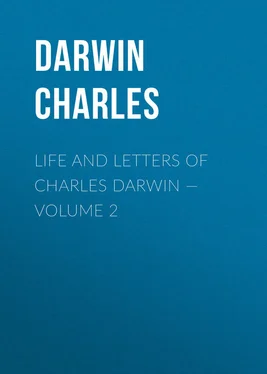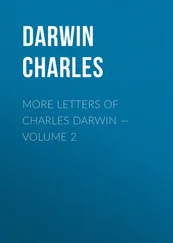Charles Darwin - Life and Letters of Charles Darwin — Volume 2
Здесь есть возможность читать онлайн «Charles Darwin - Life and Letters of Charles Darwin — Volume 2» — ознакомительный отрывок электронной книги совершенно бесплатно, а после прочтения отрывка купить полную версию. В некоторых случаях можно слушать аудио, скачать через торрент в формате fb2 и присутствует краткое содержание. Жанр: foreign_antique, foreign_prose, на английском языке. Описание произведения, (предисловие) а так же отзывы посетителей доступны на портале библиотеки ЛибКат.
- Название:Life and Letters of Charles Darwin — Volume 2
- Автор:
- Жанр:
- Год:неизвестен
- ISBN:нет данных
- Рейтинг книги:3 / 5. Голосов: 1
-
Избранное:Добавить в избранное
- Отзывы:
-
Ваша оценка:
- 60
- 1
- 2
- 3
- 4
- 5
Life and Letters of Charles Darwin — Volume 2: краткое содержание, описание и аннотация
Предлагаем к чтению аннотацию, описание, краткое содержание или предисловие (зависит от того, что написал сам автор книги «Life and Letters of Charles Darwin — Volume 2»). Если вы не нашли необходимую информацию о книге — напишите в комментариях, мы постараемся отыскать её.
Life and Letters of Charles Darwin — Volume 2 — читать онлайн ознакомительный отрывок
Ниже представлен текст книги, разбитый по страницам. Система сохранения места последней прочитанной страницы, позволяет с удобством читать онлайн бесплатно книгу «Life and Letters of Charles Darwin — Volume 2», без необходимости каждый раз заново искать на чём Вы остановились. Поставьте закладку, и сможете в любой момент перейти на страницу, на которой закончили чтение.
Интервал:
Закладка:
[The meeting of the British Association at Oxford in 1860 is famous for two pitched battles over the 'Origin of Species.' Both of them originated in unimportant papers. On Thursday, June 28, Dr. Daubeny of Oxford made a communication to Section D: "On the final causes of the sexuality of plants, with particular reference to Mr. Darwin's work on the 'Origin of Species.'" Mr. Huxley was called on by the President, but tried (according to the "Athenaeum" report) to avoid a discussion, on the ground "that a general audience, in which sentiment would unduly interfere with intellect, was not the public before which such a discussion should be carried on." However, the subject was not allowed to drop. Sir R. Owen (I quote from the "Athenaeum", July 7, 1860), who "wished to approach this subject in the spirit of the philosopher," expressed his "conviction that there were facts by which the public could come to some conclusion with regard to the probabilities of the truth of Mr. Darwin's theory." He went on to say that the brain of the gorilla "presented more differences, as compared with the brain of man, than it did when compared with the brains of the very lowest and most problematical of the Quadrumana." Mr. Huxley replied, and gave these assertions a "direct and unqualified contradiction," pledging himself to "justify that unusual procedure elsewhere" ('Man's Place in Nature,' by T.H. Huxley, 1863, page 114.), a pledge which he amply fulfilled. (See the 'Nat. Hist. Review,' 1861.) On Friday there was peace, but on Saturday 30th, the battle arose with redoubled fury over a paper by Dr. Draper of New York, on the 'Intellectual development of Europe considered with reference to the views of Mr. Darwin.'
The following account is from an eye-witness of the scene.
"The excitement was tremendous. The Lecture-room, in which it had been arranged that the discussion should be held, proved far too small for the audience, and the meeting adjourned to the Library of the Museum, which was crammed to suffocation long before the champions entered the lists. The numbers were estimated at from 700 to 1000. Had it been term-time, or had the general public been admitted, it would have been impossible to have accommodated the rush to hear the oratory of the bold Bishop. Professor Henslow, the President of Section D, occupied the chair and wisely announced in limine that none who had not valid arguments to bring forward on one side or the other, would be allowed to address the meeting: a caution that proved necessary, for no fewer than four combatants had their utterances burked by him, because of their indulgence in vague declamation.
"The Bishop was up to time, and spoke for full half-an-hour with inimitable spirit, emptiness and unfairness. It was evident from his handling of the subject that he had been 'crammed' up to the throat, and that he knew nothing at first hand; in fact, he used no argument not to be found in his 'Quarterly' article. He ridiculed Darwin badly, and Huxley savagely, but all in such dulcet tones, so persuasive a manner, and in such well-turned periods, that I who had been inclined to blame the President for allowing a discussion that could serve no scientific purpose now forgave him from the bottom of my heart. Unfortunately the Bishop, hurried along on the current of his own eloquence, so far forgot himself as to push his attempted advantage to the verge of personality in a telling passage in which he turned round and addressed Huxley: I forgot the precise words, and quote from Lyell. 'The Bishop asked whether Huxley was related by his grandfather's or grandmother's side to an ape.' (Lyell's 'Letters,' vol. ii. page 335.) Huxley replied to the scientific argument of his opponent with force and eloquence, and to the personal allusion with a sel-restraint, that gave dignity to his crushing rejoinder."
Many versions of Mr. Huxley's speech were current: the following report of his conclusion is from a letter addressed by the late John Richard Green, then an undergraduate, to a fellow-student, now Professor Boyd Dawkins. "I asserted, and I repeat, that a man has no reason to be ashamed of having an ape for his grandfather. If there were an ancestor whom I should feel shame in recalling, it would be a MAN, a man of restless and versatile intellect, who, not content with an equivocal (Prof. V. Carus, who has a distinct recollection of the scene, does not remember the word equivocal. He believes too that Lyell's version of the "ape" sentence is slightly incorrect.) success in his own sphere of activity, plunges into scientific questions with which he has no real acquaintance, only to obscure them by an aimless rhetoric, and distract the attention of his hearers from the real point at issue by eloquent digressions, and skilled appeals to religious prejudice."
The letter above quoted continues:
"The excitement was now at its height; a lady fainted and had to be carried out, and it was some time before the discussion was resumed. Some voices called for Hooker, and his name having been handed up, the President invited him to give his view of the theory from the Botanical side. This he did, demonstrating that the Bishop, by his own showing, had never grasped the principles of the 'Origin' (With regard to the Bishop's 'Quarterly Review,' my father wrote: "These very clever men think they can write a review with a very slight knowledge of the book reviewed or subject in question."), and that he was absolutely ignorant of the elements of botanical science. The Bishop made no reply, and the meeting broke up.
"There was a crowded conversazione in the evening at the rooms of the hospitable and genial Professor of Botany, Dr. Daubeny, where the almost sole topic was the battle of the 'Origin,' and I was much struck with the fair and unprejudiced way in which the black coats and white cravats of Oxford discussed the question, and the frankness with which they offered their congratulations to the winners in the combat.]
CHARLES DARWIN TO J.D. HOOKER. Sudbrook Park, Monday night [July 2nd, 1860].
My dear Hooker,
I have just received your letter. I have been very poorly, with almost continuous bad headache for forty-eight hours, and I was low enough, and thinking what a useless burthen I was to myself and all others, when your letter came, and it has so cheered me; your kindness and affection brought tears into my eyes. Talk of fame, honour, pleasure, wealth, all are dirt compared with affection; and this is a doctrine with which, I know, from your letter, that you will agree with from the bottom of your heart... How I should have liked to have wandered about Oxford with you, if I had been well enough; and how still more I should have liked to have heard you triumphing over the Bishop. I am astonished at your success and audacity. It is something unintelligible to me how any one can argue in public like orators do. I had no idea you had this power. I have read lately so many hostile views, that I was beginning to think that perhaps I was wholly in the wrong, and that — was right when he said the whole subject would be forgotten in ten years; but now that I hear that you and Huxley will fight publicly (which I am sure I never could do), I fully believe that our cause will, in the long-run, prevail. I am glad I was not in Oxford, for I should have been overwhelmed, with my [health] in its present state.
CHARLES DARWIN TO T.H. HUXLEY. Sudbrook Park, Richmond, July 3rd [1860].
... I had a letter from Oxford, written by Hooker late on Sunday night, giving me some account of the awful battles which have raged about species at Oxford. He tells me you fought nobly with Owen (but I have heard no particulars), and that you answered the B. of O. capitally. I often think that my friends (and you far beyond others) have good cause to hate me, for having stirred up so much mud, and led them into so much odious trouble. If I had been a friend of myself, I should have hated me. (How to make that sentence good English, I know not.) But remember, if I had not stirred up the mud, some one else certainly soon would. I honour your pluck; I would as soon have died as tried to answer the Bishop in such an assembly...
Читать дальшеИнтервал:
Закладка:
Похожие книги на «Life and Letters of Charles Darwin — Volume 2»
Представляем Вашему вниманию похожие книги на «Life and Letters of Charles Darwin — Volume 2» списком для выбора. Мы отобрали схожую по названию и смыслу литературу в надежде предоставить читателям больше вариантов отыскать новые, интересные, ещё непрочитанные произведения.
Обсуждение, отзывы о книге «Life and Letters of Charles Darwin — Volume 2» и просто собственные мнения читателей. Оставьте ваши комментарии, напишите, что Вы думаете о произведении, его смысле или главных героях. Укажите что конкретно понравилось, а что нет, и почему Вы так считаете.












